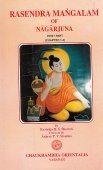Kaviraja, Kavirāja, Kavi-raja: 8 definitions
Introduction:
Kaviraja means something in Hinduism, Sanskrit, the history of ancient India. If you want to know the exact meaning, history, etymology or English translation of this term then check out the descriptions on this page. Add your comment or reference to a book if you want to contribute to this summary article.
In Hinduism
Purana and Itihasa (epic history)
Source: archive.org: Puranic EncyclopediaKavirāja (कविराज).—A Sanskrit poet who lived in India in the 12th Century A.D. His chief works are "Rāghavapāṇḍavīya" and "Pārijātaharaṇa". His real name was Mādhavabhaṭṭa.

The Purana (पुराण, purāṇas) refers to Sanskrit literature preserving ancient India’s vast cultural history, including historical legends, religious ceremonies, various arts and sciences. The eighteen mahapuranas total over 400,000 shlokas (metrical couplets) and date to at least several centuries BCE.
India history and geography
Source: Cologne Digital Sanskrit Dictionaries: Indian Epigraphical GlossaryKavirāja.—(IA 26), title; sometimes found also among the Musalmans. Note: kavirāja is defined in the “Indian epigraphical glossary” as it can be found on ancient inscriptions commonly written in Sanskrit, Prakrit or Dravidian languages.

The history of India traces the identification of countries, villages, towns and other regions of India, as well as mythology, zoology, royal dynasties, rulers, tribes, local festivities and traditions and regional languages. Ancient India enjoyed religious freedom and encourages the path of Dharma, a concept common to Buddhism, Hinduism, and Jainism.
Languages of India and abroad
Sanskrit dictionary
Source: DDSA: The practical Sanskrit-English dictionaryKavirāja (कविराज).—
1) a great poet; श्रीहर्षं कविराजराजिमुकुटालङ्कारहीरः सुतम् (śrīharṣaṃ kavirājarājimukuṭālaṅkārahīraḥ sutam) occurring in the last verse of every canto of Naiṣadha Charita.
2) Name of a poet, author of a poem called राघवपाण्डवीय (rāghavapāṇḍavīya).
Derivable forms: kavirājaḥ (कविराजः).
Kavirāja is a Sanskrit compound consisting of the terms kavi and rāja (राज).
Source: Cologne Digital Sanskrit Dictionaries: Cappeller Sanskrit-English DictionaryKavirāja (कविराज).—[masculine] king of poets; [Name] of a poet.
Source: Cologne Digital Sanskrit Dictionaries: Aufrecht Catalogus Catalogorum1) Kavirāja (कविराज) as mentioned in Aufrecht’s Catalogus Catalogorum:—See Śrīpāla.
2) Kavirāja (कविराज):—poet, an ancestor of Rājaśekhara. Śp. p. 77. [Sūktikarṇāmṛta by Śrīdharadāsa]
3) Kavirāja (कविराज):—Ānandalaharīṭīkā. Oudh. X, 22.
4) Kavirāja (कविराज):—lived under king Kāmadeva of Jayantīpurī: Rākṣasakāvyaṭīkā. L. 2821. Rāghavapāṇḍavīya.
Source: Cologne Digital Sanskrit Dictionaries: Monier-Williams Sanskrit-English Dictionary1) Kavirāja (कविराज):—[=kavi-rāja] [from kavi] m. a king of poets, [Vāmana’s Kāvyālaṃkāravṛtti iv, 1, 10]
2) [v.s. ...] Name of the author of the Rāghavapāṇḍavīya, [Bālarāmāyaṇa viii, 20]
[Sanskrit to German]
Sanskrit, also spelled संस्कृतम् (saṃskṛtam), is an ancient language of India commonly seen as the grandmother of the Indo-European language family (even English!). Closely allied with Prakrit and Pali, Sanskrit is more exhaustive in both grammar and terms and has the most extensive collection of literature in the world, greatly surpassing its sister-languages Greek and Latin.
See also (Relevant definitions)
Starts with: Kaviraja bhikshu, Kavirajabhikshu, Kavirajacandra maudgalya, Kavirajagiri, Kavirajakautuka, Kavirajamishra, Kavirajanarayana, Kavirajasoma, Kavirajavasumdhara, Kavirajavyasa, Kavirajayati.
Ends with: Ashokaviraja, Bhavanidasa kaviraja, Devakinandana kaviraja, Gopinatha kaviraja, Jagannathasena kaviraja, Jatadhara kaviraja, Kashipati kaviraja, Madhava kaviraja, Narasimha kaviraja, Narayanadasa kaviraja, Palakaviraja, Ramamanika kaviraja, Shripala kaviraja, Shripalakaviraja, Sushenakaviraja, Tandava kaviraja, Vankimadasa kaviraja, Vishvanatha kaviraja, Vishvanathakaviraja.
Full-text (+69): Samkhyatattvapradipa, Kavirajakautuka, Kavirajavasumdhara, Kavirajayati, Kavirajabhikshu, Samkhyatattvapradipika, Raghavapandaviya, Rupakavirajagosvamigunaleshasucakashtaka, Vankimadasa, Palakaviraja, Bhavanidasa, Vishvanathabhatta, Kuvalayashvacaritra, Sahityadarpana, Vishvanathakaviraja, Krishnadasa kaviraja gosvamin, Narayanadasa kaviraja, Shripala, Narasimha, Dravyaguna rajavallabha.
Relevant text
Search found 39 books and stories containing Kaviraja, Kavirāja, Kavi-raja, Kavi-rāja; (plurals include: Kavirajas, Kavirājas, rajas, rājas). You can also click to the full overview containing English textual excerpts. Below are direct links for the most relevant articles:
Kavyamimamsa of Rajasekhara (Study) (by Debabrata Barai)
Part 5 - Rājaśekhara’s Province and Religion < [Chapter 1 - Introduction]
Part 8 - Rājaśekhara and Prākṛita Language < [Chapter 1 - Introduction]
Part 7 - Personalities of Rājaśekhara < [Chapter 1 - Introduction]
Rasa Jala Nidhi, vol 1: Initiation, Mercury and Laboratory (by Bhudeb Mookerjee)
Part 12 - Mercurial operations (10): Swallowing of metals of Mercury (grasana) < [Chapter IV-V - Mercurial operations]
Srila Gurudeva (The Supreme Treasure) (by Swami Bhaktivedanta Madhava Maharaja)
Finding Śrīmatī Rādhārāṇī’s Nose Ring < [Chapter 2.2 - Śrīman Mahāprabhu’s Greatest Donation]
Receiving all Moods from Śrī Guru < [Chapter 2.12 - Early ISKCON Conversations with Śrīla Gurudeva]
Śrīman Mahāprabhu’s Greatest Donation (Introduction) < [Chapter 2.2 - Śrīman Mahāprabhu’s Greatest Donation]
A History of Indian Philosophy Volume 4 (by Surendranath Dasgupta)
Part 1 - Caitanya’s Biographers < [Chapter XXXII - Caitanya and his Followers]
Part 4 - Gleanings from the Caitanya-caritāmṛta < [Chapter XXXII - Caitanya and his Followers]
Part 2 - The Life of Caitanya < [Chapter XXXII - Caitanya and his Followers]
Chaitanya Bhagavata (by Bhumipati Dāsa)
Verse 3.5.741 < [Chapter 5 - The Pastimes of Nityānanda]
Verse 1.2.16 < [Chapter 2 - The Lord’s Appearance]
Verse 1.1.1 < [Chapter 1 - Summary of Lord Gaura’s Pastimes]
Sahitya-kaumudi by Baladeva Vidyabhushana (by Gaurapada Dāsa)
Text 7.69 < [Chapter 7 - Literary Faults]
Text 7.60 < [Chapter 7 - Literary Faults]
The Bible of Sanskrit Poetics < [Introduction]
Related products

